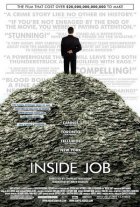
Inside Job Page #13
02:
18:31.25SCOTT TALBOTT:
The board of directors and the compensation committees are thetwo bodies best situated to determine the pay packages, uh, for executives.
CHARLES FERGUSON: How do you think they’ve done over the past 10 years?
SCOTT TALBOTT:
Well, I think that, if you look at those, uh, in, I would give about a B.Because –
CHARLES FERGUSON: A B?
SCOTT TALBOTT:
Yes.CHARLES FERGUSON: Not an F.
SCOTT TALBOTT:
Not an F, not an F.02:
18:51.11NARRATOR:
Stan O'Neal, the CEO of Merrill Lynch, received 90 million dollars in 2006and 2007 alone. After driving his firm into the ground, Merrill Lynch's board of directors
allowed him to resign; and he collected 161 million dollars in severance.
02:
19:08.05CHARLES FERGUSON: Instead of being fired, Stan O'Neal is allowed to resign, and
takes away 151 million dollars.
SCOTT TALBOTT:
That's a decision that that board of directors made at that point –you know –
CHARLES FERGUSON: And what grade do you give that decision?
SCOTT TALBOTT:
Uh, that's a tougher one. I don't know if I would give that one a B aswell.
02:
19:23.24Inside Job transcript – Sony Pictures – September 2010
58
NARRATOR:
O'Neal's successor, John Thain, was paid 87 million dollars in 2007; andin December of 2008, two months after Merrill was bailed out by U.S. taxpayers, Thain
and Merrill's board handed out billions in bonuses.
In March of 2008, AIG's Financial Products Division lost 11 billion dollars. Instead of
being fired, Joseph Cassano, the head of AIGFP, was kept on as a consultant – for a
million dollars a month.
02:
19:55.27MARTIN SULLIVAN:
And you want to make sure that the key players and the key, keyemployees, uh, within AIGFP; yeah, we retain that intellectual knowledge.
02:
20:03.18DOMINIQUE STRAUSS-KAHN: I attended a very interesting, uh, dinner, organized by
Hank Paulson, a little more than one year ago; uh, with some officials and a couple of,
uh, CEOs from the biggest, uh, banks in the U.S. And uh, surprisingly enough, all these
gentlemen were arguing, uh, we were too greedy; so we have part responsibility. Fine.
And then they were turning to the treasurer, to the secretary of the Treasury, and say,
you should regulate more, because we are too greedy, we can't avoid it. The only way
to avoid this is to have more regulation.
02:
20:34.03CHARLES FERGUSON: I have spoken to many bankers about –
DOMINIQUE STRAUSS-KAHN: Um hm.
CHARLES FERGUSON: – this question, including very senior ones. And uh, this is the
first time that I've ever heard anybody say that they actually wanted their compensation
to be regulated –
DOMINIQUE STRAUSS-KAHN: Yeah, because it was at the moment where they were
afraid. And uh, after, when solution to the crisis began to appear, then probably they,
they changed their mind.
02:
21:00.06NARRATOR:
In the U.S., the banks are now bigger, more powerful, and moreconcentrated than ever before.
Inside Job transcript – Sony Pictures – September 2010
59
MARTIN WOLF:
There are fewer competitors, and a lot of smaller banks have beentaken over by big ones. JP Morgan today is even bigger than it was before.
NOURIEL ROUBINI:
JP Morgan took over first Bear Stearns and then WAMU; Bank ofAmerica took over Countrywide and Merrill Lynch; Wells Fargo took over Wachovia.
02:
21:26.25NARRATOR:
After the crisis, the financial industry, including the Financial ServicesRoundtable, worked harder than ever to fight reform. The financial sector employs 3,000
lobbyists, more than five for each member of Congress.
02:
21:41.04CHARLES FERGUSON: Do you think the financial services industry has excessive
political influence in the United States?
SCOTT TALBOTT:
No. I think that every person in, in the w-, in the country isrepresented here in Washington.
CHARLES FERGUSON: And you think that all segments of American society have
equal and fair access to the system?
SCOTT TALBOTT:
The, you can walk into any hearing room, uh, that you would like.Yes, I do.
CHARLES FERGUSON: Um, one could walk into any hearing room; one can not
necessarily write the kind of lobbying checks that your industry writes, or engage in the
level of political contributions that your industry engages in.
02:
22:16.28NARRATOR:
Between 1998 and 2008, the financial industry spent over 5 billion dollarson lobbying and campaign contributions. And since the crisis, they're spending even
more money.
02:
22:30.07 The financial industry also exerts its influence in a more subtle way; onethat most Americans don't know about. It has corrupted the study of economics itself.
GEORGE SOROS:
Deregulation had tremendous financial and intellectual support.Because, uh, uh, people argued it for their own benefit. The economics profession was
the main source of that illusion.
02:
22:58.15Inside Job transcript – Sony Pictures – September 2010
60
NARRATOR:
Since the 1980s, academic economists have been major advocates ofderegulation, and played powerful roles in shaping U.S. government policy. Very few of
these economic experts warned about the crisis. And even after the crisis, many of
them opposed reform.
02:
23:16.20CHARLES MORRIS:
The guys who taught these things tended to get paid a lot ofmoney being consultants. Business school professors don't live on a faculty salary.
They do very, very well.
02:
23:32.03{MARTIN FELDSTEIN
PROFESSOR OF ECONOMICS, HARVARD}
CHARLES FERGUSON: Over the last decade, the financial services industry has made
about 5 billion dollars' worth of political contributions in the United States. Um; that's
kind of a lot of money.
That doesn't bother you?
MARTIN FELDSTEIN: No.
02:
23:47.26NARRATOR:
Martin Feldstein is a professor at Harvard, and one of the world's mostprominent economists. As President Reagan's chief economic advisor, he was a major
architect of deregulation. And from 1988 until 2009, he was on the board of directors of
both AIG and AIG Financial Products, which paid him millions of dollars.
02:
24:10.05CHARLES FERGUSON: You have any regrets about having been on AIG's board?
MARTIN FELDSTEIN: I have no comments. No, I have no regrets about being on AIG's
board.
CHARLES FERGUSON: None.
MARTIN FELDSTEIN: That I can s-, absolutely none. Absolutely none.
CHARLES FERGUSON: Okay. Um – you have any regrets about, uh, AIG's decisions?
MARTIN FELDSTEIN: I cannot say anything more about AIG.
Inside Job transcript – Sony Pictures – September 2010
61
02:
24:32.01{GLENN HUBBARD
CHIEF ECONOMIC ADVISOR, BUSH ADMINISTRATION
DEAN, COLUMBIA BUSINESS SCHOOL}
GLENN HUBBARD:
I've taught at Northwestern and Chicago, Harvard and Columbia.NARRATOR:
Glenn Hubbard is the dean of Columbia Business School, and was thechairman of the Council of Economic Advisers under George W. Bush.
02:
24:44.16CHARLES FERGUSON: Do you think the financial services industry has too much, uh,
political power in the United States?
Translation
Translate and read this script in other languages:
Select another language:
- - Select -
- 简体中文 (Chinese - Simplified)
- 繁體中文 (Chinese - Traditional)
- Español (Spanish)
- Esperanto (Esperanto)
- 日本語 (Japanese)
- Português (Portuguese)
- Deutsch (German)
- العربية (Arabic)
- Français (French)
- Русский (Russian)
- ಕನ್ನಡ (Kannada)
- 한국어 (Korean)
- עברית (Hebrew)
- Gaeilge (Irish)
- Українська (Ukrainian)
- اردو (Urdu)
- Magyar (Hungarian)
- मानक हिन्दी (Hindi)
- Indonesia (Indonesian)
- Italiano (Italian)
- தமிழ் (Tamil)
- Türkçe (Turkish)
- తెలుగు (Telugu)
- ภาษาไทย (Thai)
- Tiếng Việt (Vietnamese)
- Čeština (Czech)
- Polski (Polish)
- Bahasa Indonesia (Indonesian)
- Românește (Romanian)
- Nederlands (Dutch)
- Ελληνικά (Greek)
- Latinum (Latin)
- Svenska (Swedish)
- Dansk (Danish)
- Suomi (Finnish)
- فارسی (Persian)
- ייִדיש (Yiddish)
- հայերեն (Armenian)
- Norsk (Norwegian)
- English (English)
Citation
Use the citation below to add this screenplay to your bibliography:
Style:MLAChicagoAPA
"Inside Job" Scripts.com. STANDS4 LLC, 2025. Web. 24 Feb. 2025. <https://www.scripts.com/script/inside_job_42>.







Discuss this script with the community:
Report Comment
We're doing our best to make sure our content is useful, accurate and safe.
If by any chance you spot an inappropriate comment while navigating through our website please use this form to let us know, and we'll take care of it shortly.
Attachment
You need to be logged in to favorite.
Log In